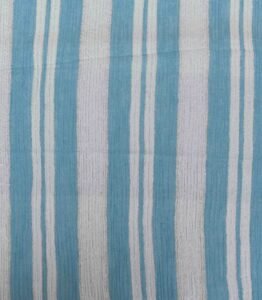A lot of people assume polyester is just a cheap, outdated option. But walk into any fabric showroom or scroll through sourcing catalogs, and you’ll find it popping up everywhere. The reason? It still works—and often better than you’d expect.
At Dinesh Exports, we’ve seen firsthand how woven fabric polyester fits into real-world fashion needs. Buyers ask about breathability, strength, finish, and price. Polyester usually checks more boxes than most people realize.
Whether you’re designing structured garments or need something that performs across seasons, woven polyester can be a smart choice. Here’s why it keeps showing up in sourcing conversations.
What Makes Woven Polyester Different?
Unlike knits, woven polyester is made by crossing yarns at right angles. This simple method creates structure and durability, which is why it’s often used for shirts, uniforms, trousers, and even outerwear.
Polyester yarns themselves are synthetic, spun from long chains of plastic-based fibers. When woven, these fibers hold their shape, resist stretching, and maintain color over time.
It’s not a fancy process. But it gets the job done—and sometimes, that’s what matters most.
Where You’ll See Woven Polyester in Action
Here are a few common ways it shows up:
- Shirting and blouses: Holds shape after multiple washes
- Trousers and suiting: Keeps pleats sharp and doesn’t shrink
- Outerwear: Often chosen for windbreakers, jackets, or uniforms
- Lining fabrics: Lightweight but strong
- Workwear and school uniforms: Durable enough for everyday use
For many brands, especially those working at scale, polyester offers consistency. It behaves the same across batches and holds color well, making it easier to plan production.
Why Brands Still Choose It
Let’s talk about what makes woven polyester stand out—beyond the price point.
1. Durability
This fabric is built to last. Unlike some natural fibers, polyester resists tears and holds up under daily wear. That’s why it’s common in garments that take a lot of stress, like uniforms or backpacks.
2. Color Retention
Because of how it absorbs dye, woven polyester keeps its color longer. Prints stay crisp, and yarn dyed patterns hold up across washes.
3. Low Maintenance
No special care needed. Polyester doesn’t wrinkle easily, dries quickly, and doesn’t shrink in the wash. That’s a win for both consumers and production teams.
4. Blending Power
It pairs well with cotton, viscose, linen, or even elastane. These blends bring together the best of both worlds—comfort from the natural fiber, structure from the polyester.
How We Work With Polyester at Dinesh Exports
Our woven polyester fabrics are made with care and flexibility in mind. Whether it’s a full poly weave or a blend, we match the yarn and weave structure to what the buyer actually needs.
A few of our common developments include:
- Poly-cotton blends for schoolwear and shirting
- Poly-viscose checks for structured formalwear
- Recycled polyester dobby for brands focused on sustainability
- Poly-flax textured styles for lightweight fashion applications
If a client wants better handfeel, we use brushed or suede finishes. If performance matters more, we adjust the weave to give more strength or water resistance.
If you are looking for a reliable woven fabric manufacturer, please contact us.
Questions We Often Hear
Is polyester still relevant in sustainable fashion?
It depends. Virgin polyester is petroleum-based, but recycled polyester (rPET) is becoming more common. We offer GRS-certified versions for eco-conscious brands.
Can woven polyester feel soft?
Yes. With the right weave and finishing, it can feel surprisingly smooth—almost like rayon or silk. It’s no longer the scratchy fabric it used to be.
Does it breathe well?
Pure polyester doesn’t breathe as much as cotton, but with blends and open weaves, breathability can be improved. It’s about choosing the right construction.
A Quick Word Before You Source
Woven fabric polyester isn’t just a fallback. It’s a dependable option that, when used right, delivers results. It’s sharp enough for tailoring, tough enough for uniforms, and flexible enough to blend into trend-led collections.
At our mill, we treat polyester with the same focus as any premium fiber—because at the end of the day, it’s about the fabric’s performance, not just its name.
If you’d like to see what we’re working on with polyester right now, our digital swatches are ready to browse. No sign-ups, just fabrics.




